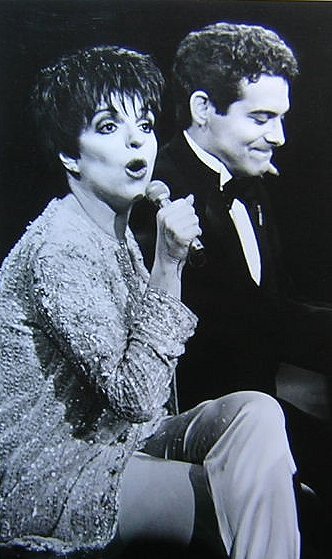
A MATTER OF TIME (Vincente Minnelli, 1976)By Dennis Grunes
Many of us recall the scandal. Vincente Minnelli, who had such high hopes that A Matter of Time would be his masterpiece, repudiated the result after the studio re-edited his material, making nonsense of the plot, which became a string of loose beads revolving around an ornate hand mirror, which more or less became the film’s protagonist. Martin Scorsese, the year of Taxi Driver, took out a huge ad in Variety supporting Minnelli and condemning American-Internatio nal. Of course, we would all prefer to have Minnelli’s cut; but A Matter of Time is a lovely thing even in its mutilated state. It is intermittently affecting and even moving (and gorgeously photographed by 2001’s and Cabaret’s Geoffrey Unsworth); and, as everyone agreed at the time, Ingrid Bergman gives a vivid performance as mad Countess Sanziani, whose memories of her fabulous life may or may not comport with reality. “The Contessa” lives in Rome, in what was once an elegant hotel, by pawning jewelry, and she is down to her last piece. Fortunately, Nina, the chambermaid who befriends her, discovers that some of The Contessa’s paper money is worth something; but it hardly matters when the old woman is hit by a car in traffic Minnelli’s last film, set in 1949, is based on Marcel Druon’s 1955 novel La volupté d’être (The Voluptuousness of Being), which was published in the U.S. as Film of Memory. The Contessa shares her “memories” with Nina by replaying her mental film of them, the object being to infuse the scattered 19-year-old girl with her passion for life; Nina takes to this “film,” sometimes appearing in it (to our eyes) as a substitute for The Contessa, and to real films thereafter, becoming a popular movie star. Regrettably, The Contessa’s philosophy of life is cornball-Auntie Mame-ish, and one wonders whether Vivien Leigh transcended this element of the role in a 1960s stage adaptation. Bergman doesn’t quite. Minnelli mines the same theme here as he does in Gigi (1958): old age’s generosity in yielding to youth. In Gigi, the baton is passed from uncle to nephew; here, spirit is passed between the two women, a figurative aunt and niece. Liza Minnelli, the director’s daughter, is the star of the film; her Nina—a role that twenty years earlier Bergman herself had wanted to play—is delicious and delightful; she is very nearly as good here as Bergman is, if a bit theatrical at times. (Or is it mock-theatrical? ) Charles Boyer, in his one long scene as Count Sanziani, who has been estranged from his wife for forty years, is effortless. Isabella Rossellini, beauteous Bergman’s beauteous daughter, plays Sister Pia, who tends to The Contessa in her last hour. Scorsese would have an affair with Liza and would marry Isabella. Hm.
Many of us recall the scandal. Vincente Minnelli, who had such high hopes that A Matter of Time would be his masterpiece, repudiated the result after the studio re-edited his material, making nonsense of the plot, which became a string of loose beads revolving around an ornate hand mirror, which more or less became the film’s protagonist. Martin Scorsese, the year of Taxi Driver, took out a huge ad in Variety supporting Minnelli and condemning American-Internatio nal. Of course, we would all prefer to have Minnelli’s cut; but A Matter of Time is a lovely thing even in its mutilated state. It is intermittently affecting and even moving (and gorgeously photographed by 2001’s and Cabaret’s Geoffrey Unsworth); and, as everyone agreed at the time, Ingrid Bergman gives a vivid performance as mad Countess Sanziani, whose memories of her fabulous life may or may not comport with reality. “The Contessa” lives in Rome, in what was once an elegant hotel, by pawning jewelry, and she is down to her last piece. Fortunately, Nina, the chambermaid who befriends her, discovers that some of The Contessa’s paper money is worth something; but it hardly matters when the old woman is hit by a car in traffic Minnelli’s last film, set in 1949, is based on Marcel Druon’s 1955 novel La volupté d’être (The Voluptuousness of Being), which was published in the U.S. as Film of Memory. The Contessa shares her “memories” with Nina by replaying her mental film of them, the object being to infuse the scattered 19-year-old girl with her passion for life; Nina takes to this “film,” sometimes appearing in it (to our eyes) as a substitute for The Contessa, and to real films thereafter, becoming a popular movie star. Regrettably, The Contessa’s philosophy of life is cornball-Auntie Mame-ish, and one wonders whether Vivien Leigh transcended this element of the role in a 1960s stage adaptation. Bergman doesn’t quite. Minnelli mines the same theme here as he does in Gigi (1958): old age’s generosity in yielding to youth. In Gigi, the baton is passed from uncle to nephew; here, spirit is passed between the two women, a figurative aunt and niece. Liza Minnelli, the director’s daughter, is the star of the film; her Nina—a role that twenty years earlier Bergman herself had wanted to play—is delicious and delightful; she is very nearly as good here as Bergman is, if a bit theatrical at times. (Or is it mock-theatrical? ) Charles Boyer, in his one long scene as Count Sanziani, who has been estranged from his wife for forty years, is effortless. Isabella Rossellini, beauteous Bergman’s beauteous daughter, plays Sister Pia, who tends to The Contessa in her last hour. Scorsese would have an affair with Liza and would marry Isabella. Hm.













































































































No comments:
Post a Comment